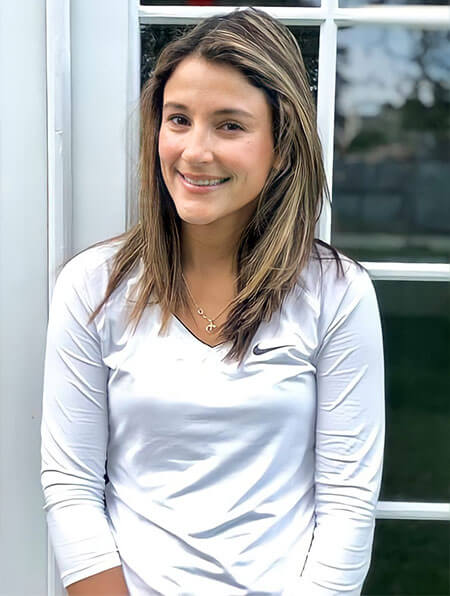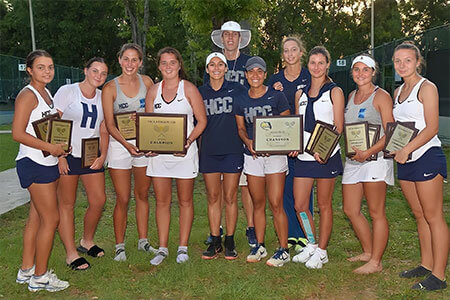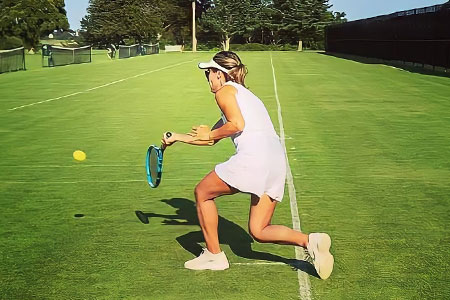
Jennifer Gelhaus has been a teaching professional for the last 13 years. She is a certified USPTA coach and was the Director of Junior Tennis and Assistant Director at the Boulevard Tennis Club in Vero Beach, Florida. She has also taught tennis at several other clubs including the Harbour Island Athletic Club and the Jupiter Island Club.
At the collegiate level, she received the 2018 FCSAA Coach of the Year award as her team went from last place in their region to National Runner up in under a year. She recruited and coached 10 All-Americans during her 3 years at Hillsborough Community College (HCC) in Tampa, Florida. Currently living between Tampa and Martha’s Vineyard during the summer, she has most recently signed on as the Director of Tennis at East Chop Tennis Shop on Martha’s Vineyard. Born in Barquisimeto, Venezuela, Galhaus moved to the United States to attend Indiana University School of Medicine at just 16 years old.
How did you get involved in tennis? I started playing tennis when I was 11 years old after many years of participating in other sports and dance. I fell in love with tennis right away and quickly started competing in tournaments. I graduated from high school when I was 16, so I didn’t get to play many years of junior tennis but I got the opportunity to play college tennis in the US.
What has your experience been playing tennis at the collegiate level? I loved playing College tennis. I was not aware of College tennis growing up and didn’t really consider it for myself until about half way through my senior year of High School. Because of College tennis I was able to move to another country, get a free education, make friends from all over the world, and meet my husband of 10 years. So, I would say that College tennis changed my life. I had a great experience and enjoyed competing as a team which is something I never got to do as a junior player. Just being able to continue playing and competing after high school was invaluable.
Why did you set out to become a teaching professional? I studied Biology and Chemistry and got a job doing research right out of College at Indiana University school of Medicine. I had plans of getting a PhD in Molecular Biology and doing research for the rest of my life. I really thought I had it all figured out career wise! I was in grad school and working in a lab full time but I missed tennis so much. I decided to volunteer as an assistant tennis coach at IUPUI. I was super busy with school, my job at the lab and coaching but I started to realize that coaching was the one that I looked forward to the most. I just couldn’t wait to get on a court. After 4 years I decided to coach tennis full time and got certified by the USPTA. I never considered coaching tennis as a career growing up but I’ve been able to make one for myself for 12 years and counting. I enjoy teaching tennis to every age and level and my favorite part is getting people excited to play and improve their tennis!
What are some of your memorable coaching experiences? Teaching tennis has definitely brought some memorable experiences. I got to play and teach on grass courts every summer at the fabulous Maidstone Club in New York for 7 years. I had never seen nor played on a grass court before and it was an adjustment at first but something I will never forget. My favorite was seeing the kids have the time of their life playing barefoot on the grass!
Another memorable coaching experience was when my team won the NJCAA conference and regional title. It was just my second year as head coach and we went from last in our conference to number 1 in just one year! It was a nail biter finals that came down to a 3rd set tie breaker at our number 3 doubles line. It was exciting to witness the intensity and focus it took to get that win!
You were named Coach of the Year by the FCSAA and NJCAA Committees. What do you believe were some key factors that lead to this achievement? I’d say the main factor is results. It does come down to winning matches and having a winning team. When I first started as head coach the team was last in their conference and just one year later they were ranked number 2 in the country. The year before I took over the program they had a 2-13 record, my first year we went 3-10 with the same team since I joined the program in the middle of the school year. My second year we went 10-0 after most of my previous players graduated and I was able to bring in my first recruiting class. Being able to attract great players from widely different backgrounds to my program, coaching them, and getting them to work together as a team (despite having very different personalities) was the key to our success.
What would you say is your greatest contribution to the sport? My greatest contribution to the sport is my ability to instill passion and excitement for tennis in new players. I truly believe that tennis is the best sport for everyone to play. It is fun, social, competitive, a great workout and a sport you can truly play at any age. I go out of my way to make sure that everyone that comes to tennis is having the time of their life!

What does Women’s History Month mean to you? Women’s History Month is a time to reflect on the contributions made by women throughout history and their impact in our culture and society. It is inspiring to learn about women who broke the barriers of equality and to see them being highlighted, celebrated and most of all remembered.
I think women can do anything they set their mind to despite the added obstacles and prejudice we may face. I think women can do it all but it is not necessarily fair to expect women to do it all either. I feel that sometimes there is pressure for women to do it all and many times with a timeline attached to it. To be married and start a family by a certain age. To have a successful career while also having the perfect amount of family time. There are certainly many women out there that manage to do it all but it’s important to remember that not all women have the same dreams. I think the best way to empower women is not to say that “we can do it all”, but rather that we have equal opportunity and the choice to do it all.




